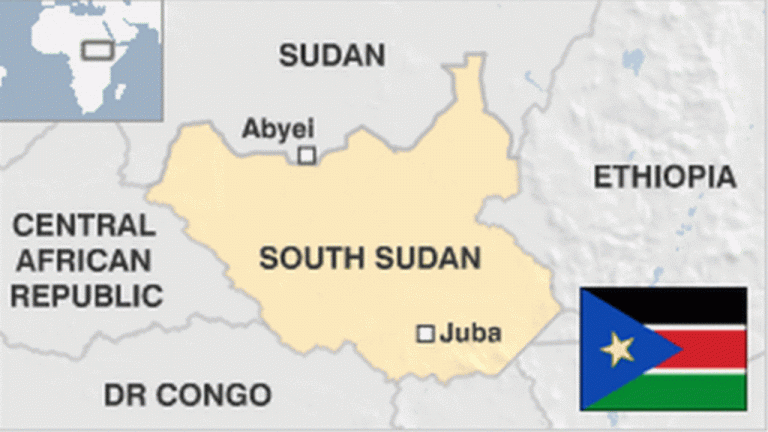As an Amazon Associate, I earn from qualifying purchases.
South Sudan, a nation that seceded and declared its independence from the country of Sudan in 2011, soon found itself thrust into a brutal civil war. The fighting began a mere 18 months after the formation of the nation, leading to insecurity within the populace that was soon punctuated by rampant famine, overcrowding, and outbreaks of serious medical conditions like measles and cholera. The Sudanese army warring with the Liberation army has also forced thousands from their homes, aggravating the issues present within the fledgling nation.
The continuing disputes have prevented the South Sudan economy from stabilizing after declaring independence in light of the Sudanese civil war. Even the capital city of Juba in South Sudan remains one of the most devastated areas, with comprehensive peace agreements being maintained only barely at times and the transitional government facing significant opposition from liberation movements and rebel forces.

Emergency funding and support have worked to alleviate the struggle for basic needs including access to food and method for maintaining hygiene, but the situation continues to grow further out of control. Even with significant U.N. peacekeeping bases being located in the region, include a base in the capital of Juba, paths for getting lifesaving aid into the country are few and far between.
The South Sudanese Civil War
In December 2013, South Sudanese President Salva Kiir accused Riek Machar, the former vice president, or attempting a coup with the assistance of ten other individuals. The catalyst is said to have occurred on December 15, 2013, when Machar, Pagan Amum, and Rebecca Nyanberg, all considered opposition leaders, voted to boycott a meeting of the National Liberation Council at Nyakuron.
As the meeting was declared a failure, fighting broke out between members of the presidential guard in the South Sudanese capital of Juba. Controversy ensued when accusations that only soldiers considered part of the Dinka ethnic group were being rearmed, and ethnic Nuer soldiers were not. This led to an additional battle with ethnic Nuer soldiers taking control of the military headquarters and leading the country’s army to become involved.
Stating the accusations were false, Machar went on to lead the Sudan People’s Liberation Movement-in-Opposition (SPLM-IO) against Kiir’s Sudan People’s Liberation Army (SPLA). As tensions rose, fighting broke out between the Sudanese government’s army and the SPLM-IO. As the conflict grew, troops from Uganda moved in to support the South Sudanese government.
As the fighting continued, thousands of people sought refuge in U.N. facilities. During this time, two Indian U.N. peacekeepers were killed while assisting 36 civilians looking to find safety with the organization. Approximately 2,000 armed Nuer youths attacked the U.N. facility, allegedly with the specific intent of killing civilians; a move that was quickly condemned by U.N. Secretary General Ban Ki-moon.
The first ceasefire agreement was reached in 2014, though fighting has continued intermittently since. Other agreements have been made, including the Compromise Peace Agreement of 2015. Throughout the conflict, approximately 300,000 people have lost their lives, including many in notable atrocities such as the Bentiu Massacre in 2014.
The civil war has continued for over three years. Attacks have taken place in military and government compounds, U.N. facilities, and civilian centers throughout the nation, with much taking place in and around the city of Juba.
Much of the fighting has taken place in agricultural centers within the nation, predominately focused towards the southern border. Additionally, the conflict bled into the country’s oil fields, with local government soldiers controlling some and rebels controlling others. While claims that production would continue normally from government-controlled fields, total production fell, creating additional financial hardship within the nation. As food and oil production fell, and the economy crumbled, many began facing food insecurity which ultimately has become widespread famine.
The Sudan Tribune
Much of the current struggle is chronicled through news outlets, specifically the Sudan Tribune. The Sudan Tribune is a nonprofit that was started in 2003 in the city of Paris. The site intends to promote free debate and plural information on occurrences in Sudan and South Sudan but has no affiliation with the small print newspaper released in Khartoum and Juba of the same name (that was founded after the website had begun). Information is provided by independent Sudanese journalists as well as with international support from journalists and editors across the globe.
Here is an overview of some of the more pressing events that have occurred recently throughout the war-torn country of South Sudan.
U.N. Relief in South Sudan
The U.N. has struggled to maintain access to some of the more famine-stricken areas of South Sudan, prompting the organization’s humanitarian coordinator for the nation, Eugene Owusu, to appeal directly to all parties to allow aid to reach hard-hit portions of the nation.
Famine was officially declared in parts of the country of South Sudan On February 20, 2017, pointing to the immediate need within the area. Without swift and robust support for organizations like the U.N., many feature a catastrophic outcome is just over the horizon.
While the U.N. base in the city of Juba struggles to keep pace with demand, other portions of the nation are also in dire need. Conflicts on the Western Bank of the Upper Nile region resulted in thousands of citizens fleeing the city of Wau Shilluk and many surrounding areas. As a result, the areas of Kodok and Aburoc have been strained as those leaving the area of conflict seek safe haven elsewhere.
Further, conflicts in the Jonglei state in South Sudan have caused many more to flee into the surrounding landscape, and aid workers were turned away when attempting to reach locations outside of the town of Lainya where thousands of citizen have gone after leaving their homes behind.
In some cases, aid workers have been forced to leave famine-stricken areas in South Sudan for fears of their own safety. For example, during the clashes in Juba in 2016, a group of South Sudanese soldiers entered the Terrain hotel facility and proceeded to gang rape multiple international aid workers. In July of that year, soldiers entered a World Food Programme warehouse and took possession of over $30 million in food, an amount designed to feed approximately 220,000 people for an entire month.
President Kiir has promised to allow aid workers full access to the nation, but battles between warring armies and anecdotal claims of government-based restrictions on aid worker movements have harmed efforts to provide food and other supplies to those in need.
The conflict throughout the area has many estimating that nearly 100,000 people potential face starvation as of this righting. Additionally, since late 2013, over 3 million individuals are considered displaced, some fleeing to other areas of the country while others left as refugees.
Support for the National Dialogue Process from Trump Administration
The president of South Sudan, President Salva Kiir, and the Vice President General Taban Deng Gai have commended the U.S. President’s support for a national dialogue aimed at finding a solution to the civil unrest plaguing the country of South Sudan. U.S. President Trump favors peace talks over a new political initiative, a move that the Transitional Government of National Unity within the country prefers.
The South Sudanese oppositions, such as South Sudan’s People’s Liberation Party (PLP), feels the national dialogue initiative launched by President Kiir is insufficient based on a lack of inclusivity. Additionally, they disagree with President Kiir appointing himself as chairman of the efforts. However, the do support the idea of a national dialogue believing they are key to creating a South Sudanese government that can provide a strong political future for the people of the nation.
It is important to note that the national dialogue proposed here is separate from the Resolution of the Conflict in the Republic of South Sudan (ARCRSS) that focused on security arrangements. This effort included the institution of a ceasefire as well as the creation of a national government that will work towards significant political reform.
The Transitional Government of National Unity and the 2015 Peace Agreement
A member of the Jieng Council of Elders estimates the Transitional Government of National Unity in South Sudan could hold power until the year 2021. The 2015 Peace Agreement requires many standards be met including the unification of South Sudan army (SPLA), restoration of national security, increased accountability within the court system the creation of a national census, and the making of a permanent constitution before elections would be held. While many hoped elections could take place in 2018, the demands of the agreement make that unlikely.
Additionally, many South Sudanese people have fled their homes during these periods of conflict. This makes holding elections more challenging as thousands of citizens are internally displaced, and almost half a million have crossed over into neighboring countries as refugees. Compile that with the estimated 5 million individuals facing food insecurity and simply securing the resources required to hold an election is out of reach.
However, President Kiir called for an early election in August 2016 with the reasoning that ascending to the office through means other than elections leaves some positioned to take advantage. While the original peace agreement stated elections should be held in 2018, it is too soon to tell if that will come to fruition.
Sudan Liberation Movement Calls for Arrest of Sudanese Officials
The Sudan Liberation Movement (SLM-MM), led my Minni Minnawi, has called for the arrest of Sudanese officials indicted for war crimes in the Darfur region. Arrest warrants were issued by the International Criminal Court (ICC) in 2009 and 2010 based on war crimes committed by President Omer al-Bashir. A warrant for Ali Mohamed Ali Abdel-Rahman was also issued in 2008 for war crimes and crimes against humanity. However, Khartoum has refused to hand over the individuals, even as the eight year anniversary for the warrant against Abdel-Rahman approaches.
Ethnic Tension in South Sudan
While the entirety of the civil war in South Sudan is more complex than simple ethnic tension, it is noted as a contributing factor. President Kiir is an ethnic Dinka while former Vice President Machar is an ethnic Nuer.
In fact, in 2010, U.S. National Intelligence officials issued a warning that rising ethnic tensions in southern Sudan could lead to mass killings and even genocide. Concerns rose as violence between the Lou Nuer and Murle populations. At one point the Nuer White Army even declared their intention to wipe out the Murle tribe as a method for defending their cattle.
Some specific incidences support the likelihood that ethnic tensions are playing a specific role in the total conflict. For example, it was reported that approximately 240 Nuer men were killed at the police station in Juba in December 2013. Most reports are based on eyewitness accounts as the areas involved are generally well-guarded, or even completely sealed off by local government officials.
Reports suggested that door-to-door searches targeting those of Nuer ethnicity were conducted in the Upper Nile State capital city of Malakal. Additionally, mass graves have been located near the city of Juba and in other surrounding areas.
The Future of South Sudan
At this time, the future of South Sudan is unknown. Much of the population is facing famine today, and more may be at risk as the conflict continues. Even as the efforts of the 2015 Peace Agreement theoretically move forward, it is unclear whether President Kiir would ultimately step down even if a democratic election selected another leader.
However, it is clear that aid is critical to maintaining any resemblance of stability within the region, especially as the economy continues to flounder and food production fails to meet the needs of the nation. Additionally, medical assistance and basic forms of hygiene are necessary to prevent additional outbreaks of potentially deadly disease within the country.
While many neighboring countries have welcomed refugees from the struggling nation, the number of those in need may outweigh their capabilities. And, as U.S. President Trump continues to stand behind certain immigration ban efforts, it is unknown whether the U.S. will look to harbor those struggling or will simply work to support efforts for a national dialogue within the South Sudanese government and opposition officials in hopes of getting things back on the right track.
Amazon and the Amazon logo are trademarks of Amazon.com, Inc, or its affiliates.


